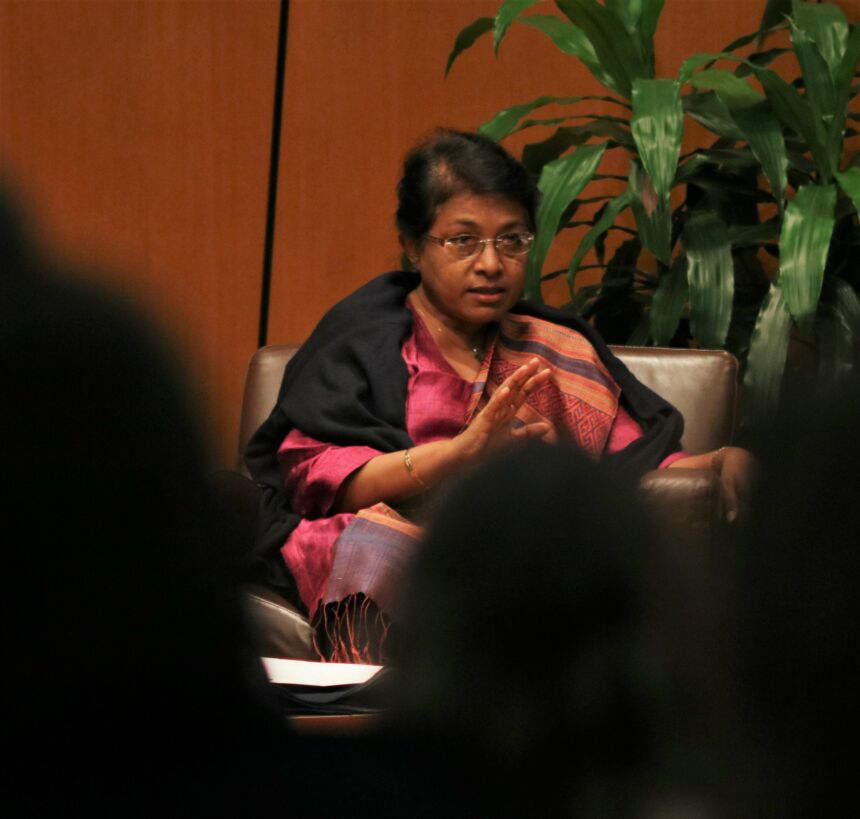September 27, 2017
International human rights panel discusses need to ‘call the bluff of the powerful’

UNIVERSITY PARK, Pa. -- There comes a time in all societies that oppress their citizens when people stand up, say enough is enough, and demand their human rights.
That idea, expressed by Chair of the Sri Lanka Human Rights Commission Dr. Deepika Udagama, was one of the major themes of a panel discussion titled “Human Rights Around the World: Flourishing or Failing?” hosted by the Penn State School of International Affairs, Penn State Law, and the Rock Ethics Institute, featuring two distinguished guests from the Sri Lankan government and experts from across Penn State.
In addition to Udagma, who was instrumental in introducing human rights issues into the study of law in Sri Lanka, the panel included Dr. Gamini Keerawella, the charge d’affaires and acting ambassador of the Sri Lanka Embassy in the United States; Shoba Sivaprasad Wadhia, Penn State Law professor and director of the Center for Immigrants’ Rights Clinic; Dr. Catherine Wanner, Penn State professor of history, anthropology, and religious studies and Barry Director of the Paterno Fellows Program; Dr. Lorraine Dowler, professor of geography and women’s studies; and School of International Affairs Director Scott Gartner, who moderated the discussion.

Lorraine Dowler, left, and Shoba Wadhia discuss the state of international human rights at the School of International Affairs.
Keerawella began the discussion by citing Sri Lanka as one of the many places around the world that has seen an improvement in human rights and accordant protections in recent history. Since the end of the Sri Lanka’s 25 years of civil war in 2005, the country has faced significant challenges in building an equitable, democratic society, but has made great strides in establishing institutions to ensure good governance, accountability, and rule of law, such as the Human Rights Commission which Udagama currently heads.
“There is a relationship between human rights and democracy, and we have to work within that framework,” Keerawella said. “Love, human empathy, democracy: All of these things are interrelated. This is the lesson we learned in Sri Lanka.”
Wanner, an expert on the subject of human rights in Ukraine, said she has been “pleasantly surprised” by the evolution of human rights in the context of religion in the former Soviet territory. Since declaring its independence, Wanner said the nation has done “remarkably well in building a sense of tolerance for religious difference,” which has led to many religious organizations using Ukraine as a base for delivering humanitarian in the region. However, she also acknowledged that human rights in the nation also face challenges due to ongoing armed conflict with Russia, which justified its annexation of the Crimean Peninsula using a doctrine intended to protect human rights.
“In 2014, you had Russia state the ‘Responsibility to Protect’ doctrine to justify what began as intervention but became armed intervention to protect their ‘compatriots,’ which they define themselves,” Wanner said. “The prelude to this conflict was this example of human rights law being turned against itself.”
Wadhia discussed the immigration and refugee law of the United States through the lens of human rights, characterizing the Trump administration’s recent decision to end the Obama-era Deferred Action for Childhood Arrivals program as a troubling example of a loss of human rights and dignity. She also noted U.S. refugee law, “one of the few areas of U.S. law derived from international treaties,” features a narrow legal definition of the term ”refugee,” making it impossible for vast numbers of people around the world to seek asylum in the United States.
“Congress has amended the statute many times, making it more difficult for people seeking protection,” Wadhia said. “We have a refugee definition that doesn’t include people fleeing climate change and environmental damage, for instance, and only includes fleeing prosecution—which itself isn’t defined, instead being based on case law.”
Dowler discussed the challenges of human rights in post-conflict societies through the lens of Northern Ireland, one of her areas of scholarly expertise. Although the country is considered “post-conflict” since the signing peace agreements that ended a lengthy period of intense sectarian violence, Dowler noted Northern Ireland has still been experiencing increased violence against women and ethnic groups.
“If we look at traditional human rights everything is fine, but everything is not fine, and we continually see this in post-conflict societies,” Dowler said. “It’s a matter of constantly keeping these issue in check. Just because a peace agreement is signed and a nation is noted as a post-conflict society doesn’t mean we don’t still have to be very careful to pay attention to what peoples’ lives are like on the ground.”
The panel also discussed a wide range of complex and interrelated human rights issues including the duties of a nation’s citizens to themselves and each other; the duties of the international community to respond to human rights crises and the challenges this entails; the positive and negative impacts of social media to encourage debate and share information while also giving extremist groups a platform for hate speech; and the importance of developing what Keerawella called “a culture of human rights.”
“Irrespective of what happens at the top-most level of a society, people’s demands are the same everywhere,” Udagama said.
“It is the duty for us as human rights advocates to call the bluff of the powerful.”
